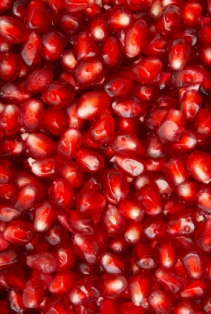Pomegranate Prevention
Study Says the Seeded Apple May Help Prevent Obesity, Diabetes
For me, the month of August is one of the more sad times of the year. It’s a month of endings: The summer’s last hurrah, the end of balmy weather, and final reminiscences at the family get-together.
On the other hand, August can be a happy time of year. It signals new beginnings: Teams returning to the gridiron, students returning to school (granted, some students happier than others), and farmers returning to fields, hoping to reap a successful harvest from their prized possessions.
The yummy pomegranate is one such prized possession, as August signals harvest time for pome-growers across the country (though pomegranates grow throughout the country, 3/4ths of the pomegranates sold in America grow in California).
Pomegranates are prized for their seeds. A rare breed indeed is the pomegranate, for its one of the few fruits heralded almost exclusively for its seeds. In fact, the literal translation of the word “pomegranate” is “apple with many seeds” or “seeded apple.”
Nutritionally, the pomegranate’s hailed for its antioxidant prowess. In a past article I wrote about the pomegranate, I cited a UCLA study that showed how pomegranate juice is the most antioxidant-filled juice on the planet. It’s also a rich source for vitamin C.
A more recent study gives even more gravitas to the great ‘granate, for it may reduce weight gain and the prevalence of diabetes.
Researchers from the University of Houston discovered this after providing 60 rats with varying amounts of fat. Twenty of the rats were fed high doses of fat, another 20 were fed the same amount of fat and supplemented with pomegranate seed oil, and the final 20 were fed a typical rat diet (whatever that is).
The end of the study revealed some surprising findings. Because not only did the group of rats fed the pomegranate oil gain less weight (10 grams less) despite eating the same amount of fat as the first group, but they also had a greater sensitivity to insulin. Insulin is what allows the body to convert the things we eat into glucose for energy expenditure. When the body resists insulin (people who are insulin resistant are typically those with type II diabetes), it results in a greater storage of fat. This is part of the reason why obesity and diabetes are so closely linked.
The study is published in the British Journal of Nutrition.
Now, I grant you, this study was performed on rats, so it can’t be applied to humans at this point. Further, 10 grams is not a whole heck of a lot when there are 453 grams in a pound.
I make these points only because the cynics are bound to make them, not to downplay the study’s findings. After all, even if the rats fed the pomegranate seed oil had lost 30 or 40 grams, you can bet the cynics would find something to criticize the findings. After all, with the cynics, their gripe is with natural health in general; they’ll search for anything to downplay what they see as “non-sense science.”
But they can’t escape the fact that pomegranates improved weight levels and insulin resistance. As small as it may have been, it happened. And just as the month of August signals the beginning of the pomegranate season, this study signals the beginning of future discoveries tying pomegranates to disease prevention (it’s already been tied to cancer prevention, not to mention Alzheimer’s disease and heart disease).
Sources:
nutraingredients.com
diabetes.org
pomegranates.org
Related Posts
- Pomegranates and Cancer Prevention – Yet Another Study Hails Pomegranates’ Cancer-Fighting Prowess
- Pomegranate Juice Yields Heart-Healthy Benefits, Study Concludes
- Black Soy Beans Shown to Lower Diabetes Risk, Study Finds
- Natural Plant Demonstrates Benefits for Treating Diabetes
- Naturally Found Plant Provides Multiple Medicinal Effects
 
|
Enjoy this article? We guarantee your privacy. Your email address will NEVER be rented, traded or sold. |
Visit my new site: Self Help On The Web
 |
 |
Posted: August 30th, 2009 under Diabetes, Obesity, Pomegranate.
Tags: pomegranates, pomegranates antioxidants, pomegranates nutrition







